Archery Instruction Certification is a structured program designed to equip individuals with the knowledge and skills to teach archery safely and effectively. USA Archery’s redesigned courses emphasize range safety, proper techniques, and instructor training, ensuring a comprehensive approach to developing archers of all levels. This certification is essential for coaches and educators, providing a foundation for teaching archery fundamentals while promoting skill development and safety standards.
1.1 Overview of Archery Instruction Certification
Archery Instruction Certification is a structured program designed to qualify individuals as competent archery instructors. It combines theoretical knowledge and practical skills, focusing on range safety, equipment handling, and teaching techniques. Certification levels vary, offering pathways for instructors to progress from basic to advanced coaching. The program emphasizes safe training practices, proper archery form, and effective lesson planning. It is recognized by organizations like USA Archery and NASP, ensuring standardized training for instructors worldwide. This certification is essential for anyone aiming to teach archery confidently and professionally.
1.2 Importance of Certification for Archery Instructors
Certification for archery instructors is crucial for ensuring safety, credibility, and effective teaching. It verifies an instructor’s ability to properly train archers, manage ranges, and repair equipment. Certification enhances trust among students and parents, boosting program enrollment. It also provides instructors with updated techniques and best practices, improving their professional development. Certified instructors can market their programs more effectively, attracting participants and supporting the growth of archery. This recognition is essential for maintaining high standards in archery instruction and fostering a safe, enjoyable learning environment.

Levels of Archery Instruction Certification
Archery instruction certification is offered in multiple levels, starting with basic safety and teaching techniques, progressing to advanced coaching and instructor training. Each level builds on the previous one, ensuring instructors gain comprehensive skills and knowledge to effectively teach archery.
2.1 Level 1 Instructor Certification
The Level 1 Instructor Certification is an entry-level program designed for individuals teaching archery in camps, schools, or youth organizations. This 8-12 hour course covers range safety, equipment setup, shooting techniques, and lesson planning. It equips instructors with the skills to teach basic archery to beginners of all ages, ensuring a safe and engaging learning environment. Completion of this certification is a foundational step for those starting their archery instruction journey.
2.2 Level 2 Instructor Certification
The Level 2 Instructor Certification is an advanced program for those with prior archery experience. This 12-20 hour course builds on Level 1 skills, focusing on equipment fitting, advanced teaching techniques, and program management. Participants learn to instruct more complex archery concepts and develop intermediate-level archers. Prerequisites include being at least 18 years old and holding a USA Archery or NFAA membership. This certification prepares instructors to lead archery programs confidently, emphasizing safety and skill progression.
2.3 Level 3 NTS Coach Certification
The Level 3 NTS Coach Certification is an advanced program designed for experienced archers and instructors. This two-part course includes an online, self-paced component and hands-on training. It focuses on refining coaching techniques, mental and physical training methods, and competitive strategies. Participants learn equipment tuning, advanced shot analysis, and how to develop high-performance archers. Prerequisites include completing Level 2 certification and demonstrating extensive archery experience. This certification equips coaches to work with elite athletes and contribute to the development of archery at higher levels.
2.4 Instructor Trainer Certification
The Instructor Trainer Certification is an advanced credential for experienced archery instructors, enabling them to train and certify others. This program focuses on developing the skills to teach archery instructors effectively. It includes curriculum development, evaluation techniques, and mentorship strategies. Candidates must hold a Level 2 certification or higher and demonstrate strong leadership and teaching abilities. This certification allows individuals to contribute to the growth of archery by training future instructors, ensuring high standards of safety and technique are maintained across programs.

Certification Process and Requirements
Archery certification involves online courses, in-person training, exams, and prerequisites like age and membership. The process ensures instructors meet safety and technical standards to teach effectively.
3.1 Online Self-Paced Courses
Online self-paced courses are a key part of archery certification, offering flexibility for learners. These courses cover range safety, equipment basics, shooting techniques, and lesson planning. Designed by organizations like USA Archery and NASP, they ensure instructors gain foundational knowledge before hands-on training. The self-paced format allows individuals to complete modules at their convenience, making it ideal for those balancing other commitments. Completion of these courses is often a prerequisite for in-person training and certification exams.
3.2 In-Person Training and Workshops
In-person training and workshops provide hands-on experience, allowing instructors to practice archery techniques under expert guidance. These sessions cover range setup, equipment handling, and safety protocols, with live demonstrations and interactive exercises. Participants receive real-time feedback, enhancing their teaching and coaching skills. Workshops often include simulations of real teaching scenarios, helping instructors refine lesson delivery. This practical training complements online courses, ensuring a well-rounded understanding of archery instruction and safety standards, preparing instructors for certification exams and real-world applications.
3.3 Certification Exams and Assessments
Certification exams and assessments evaluate an instructor’s knowledge and practical skills in archery instruction. These exams typically include a written test and a practical demonstration of teaching techniques. Candidates must demonstrate proficiency in range safety, equipment setup, and effective lesson delivery. Assessments are conducted by certified evaluators to ensure instructors meet high standards. Passing the exam with a minimum score of 80% is often required. These assessments ensure instructors are well-prepared to teach archery safely and effectively, upholding certification standards and building trust in their expertise.
3.4 Prerequisites for Certification
To pursue archery instruction certification, candidates must meet specific prerequisites. These include being at least 18 years old and holding membership with organizations like USA Archery or the National Field Archery Association. Completion of required training programs, such as the Basic Archery Instructor (BAI) course, is also necessary. Some certifications may require prior experience or background checks, ensuring candidates are qualified to teach safely and effectively. These prerequisites ensure a standardized and reputable certification process for instructors.
3.5 Maintaining Certification
Maintaining archery instruction certification requires ongoing professional development and adherence to renewal processes. Many certifications, such as USA Archery’s, must be renewed periodically, often every few years. Instructors must complete continuing education courses, workshops, or clinics to stay updated on the latest techniques and safety standards. Membership with governing bodies like USA Archery or NFAA may also be required for certification renewal. Regular updates ensure instructors remain competent and current in their teaching practices, benefiting both themselves and their students.
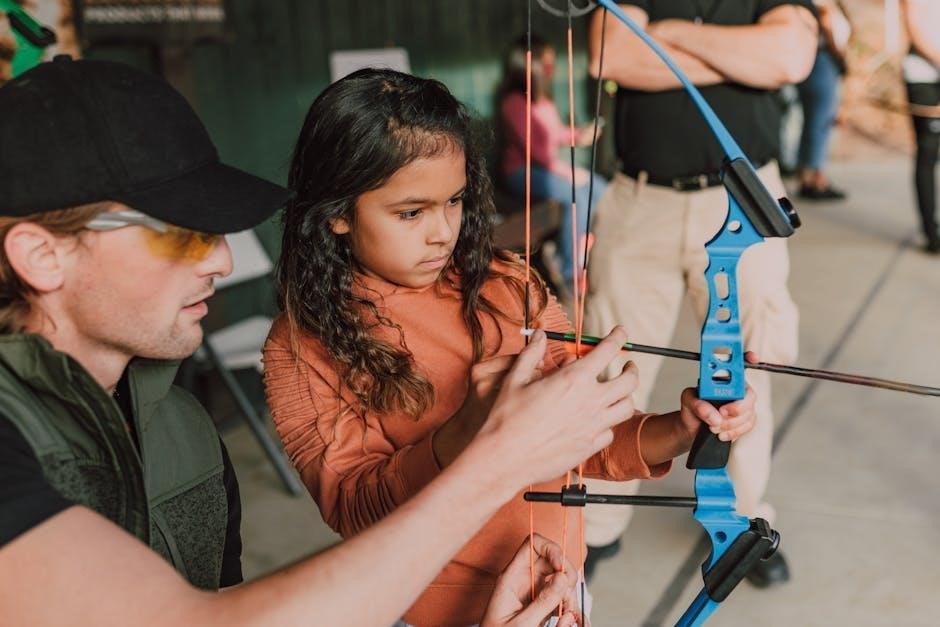
Organizations Offering Certification
Key organizations offering archery instruction certification include USA Archery, NASP, World Archery, NFAA, and Archery Education Resources, each providing specialized training and credentials for instructors globally.
4.1 USA Archery
USA Archery is the primary governing body for archery in the U.S., offering comprehensive certification programs. Their Level 1 and Level 2 Instructor Certifications are redesigned to include online self-paced courses and in-person training. These programs focus on range safety, equipment setup, and teaching techniques. USA Archery also offers the Level 3 NTS Coach Certification, which delves into advanced coaching methods and equipment repair. Obtaining certification through USA Archery enhances credibility and provides instructors with the tools to safely and effectively teach archery to all skill levels and ages. This certification is essential for coaches and educators aiming to develop archers within the USA Archery program framework.
4.2 National Archery in the Schools Program (NASP)
The National Archery in the Schools Program (NASP) offers the Basic Archery Instructor (BAI) certification, designed for educators and volunteers teaching archery in schools. The program focuses on safety, proper techniques, and engaging students in archery. Teachers must complete an 8-hour training and annual reporting of 10 hours of in-school instruction. Volunteers may attend but only certified teachers can lead programs. NASP certification ensures a safe and structured environment for introducing archery to students, promoting skill development and physical education through this precision sport.
4.3 World Archery
World Archery offers international coaching certification programs for archery instructors and coaches. These programs cater to all levels, from beginner to elite, providing standardized training and accreditation. Coaches can progress through various certifications, gaining expertise in technique, safety, and athlete development. World Archery also conducts training for international judges, ensuring consistency in officiating global events. Their certification pathways are recognized worldwide, fostering a unified approach to archery education and competition, while promoting the sport’s growth and excellence internationally.
4.4 National Field Archery Association (NFAA)
The National Field Archery Association (NFAA) offers specialized certification programs for archery instructors, such as the Advanced Instructor/Master Coach Program. This two-tiered program is designed for experienced archers and coaches, providing hands-on training in advanced coaching techniques. It covers equipment customization and mental preparation strategies, ensuring coaches can develop skilled archers. The NFAA focuses on fostering excellence in field archery, making their certifications highly regarded within the archery community, enhancing coaching standards.
4.5 Archery Education Resources
Archery Education Resources provides comprehensive training materials and certification programs for instructors. Their self-paced online courses include a training manual e-book, focusing on range safety, equipment, and teaching methods. Certification is valid for three years, ensuring instructors stay updated on best practices. The program is designed for educators, volunteers, and coaches, offering practical skills to deliver safe and effective archery instruction. This resource is ideal for those seeking to enhance their teaching capabilities in archery.

Course Content and Training
Archery certification courses cover range safety, equipment setup, shooting techniques, and lesson planning. Instructors learn how to teach archery fundamentals and ensure a safe learning environment effectively.
5.1 Range Safety and Setup
Range safety and setup are critical components of archery instruction certification. Instructors learn how to properly set up ranges, ensure equipment safety, and implement emergency procedures. Training includes inspecting equipment, understanding arrow placement, and managing risk factors. Proper range layout, archer positioning, and clear communication are emphasized to prevent accidents. Instructors are taught to create a secure environment, allowing archers to focus on skill development while adhering to safety protocols. This ensures a safe and productive learning experience for all participants.
5.2 Archery Equipment and Repair
Archery Equipment and Repair is a fundamental aspect of instructor certification. Instructors learn to identify, maintain, and repair bows, arrows, and accessories. Training covers proper equipment fitting, string maintenance, and arrow alignment. Understanding equipment customization and troubleshooting ensures optimal performance. Instructors also gain skills in assessing equipment safety and functionality, crucial for preventing accidents and ensuring archers use gear correctly. This knowledge enables instructors to guide archers effectively, enhancing their shooting experience and overall skill development.
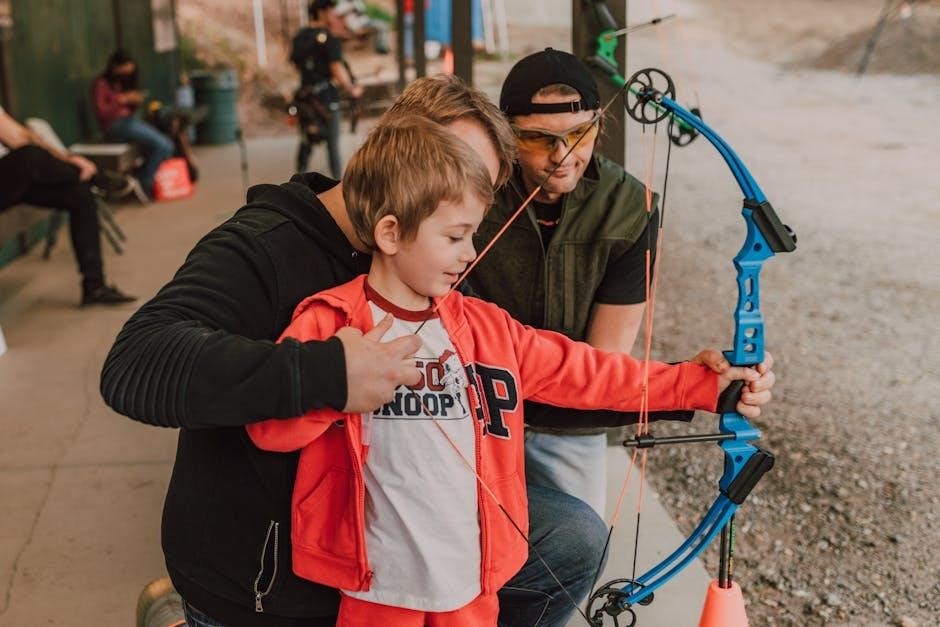
5.3 Teaching Techniques and Lesson Planning
Teaching Techniques and Lesson Planning focuses on developing effective instructional strategies for archery. Instructors learn how to structure lessons, engage students, and adapt teaching methods for different age groups and skill levels. Emphasis is placed on creating a safe and inclusive learning environment. Training includes designing lesson plans, demonstrating proper shooting form, and providing constructive feedback. Instructors also learn how to assess student progress and tailor instruction to meet individual needs, ensuring a positive and productive learning experience for all archers.
5.4 Coaching and Mentorship Skills
Coaching and Mentorship Skills focuses on developing leadership and communication abilities to guide archers effectively. Instructors learn to provide personalized feedback, motivate students, and create a supportive environment. Training emphasizes understanding individual learning styles and adapting coaching techniques accordingly. This section also covers advanced strategies for improving archer performance, fostering teamwork, and nurturing a passion for the sport. Mentorship skills are highlighted to help instructors inspire and guide archers in achieving their full potential, whether for recreational or competitive purposes.

Benefits of Archery Instruction Certification
Archery Instruction Certification enhances credibility, provides advanced coaching techniques, and expands career opportunities. It fosters confidence, improves teaching methods, and contributes to the growth of archery globally.
6.1 Enhanced Knowledge and Skills
Archery Instruction Certification provides a solid foundation in archery fundamentals, range safety, and equipment maintenance. It equips instructors with practical skills to teach proper shooting techniques and adapt lessons for diverse learners. Through structured training, instructors gain expertise in lesson planning, coaching methodologies, and archer development. This comprehensive approach ensures instructors are well-prepared to guide archers of all skill levels, fostering improvement and a lifelong passion for the sport while maintaining high safety standards.
6.2 Increased Credibility and Trust
Obtaining archery instruction certification significantly enhances an instructor’s credibility and trustworthiness. Certified instructors are recognized for their expertise, ensuring students and parents feel confident in their teaching abilities. This recognition boosts professional standing and opens doors to coaching opportunities in schools, clubs, and camps. The certification also validates an instructor’s commitment to safety, proper techniques, and ethical practices, fostering trust and respect within the archery community and beyond.
6.3 Career Opportunities in Archery
Archery instruction certification unlocks diverse career opportunities in the sport. Certified instructors can work as coaches, program directors, or range managers in schools, clubs, and camps. The certification is recognized by organizations like USA Archery and NASP, making graduates eligible for roles in youth programs, competitive coaching, and community archery initiatives. Additionally, certified instructors can lead workshops, clinics, and tournaments, expanding their professional horizons in the growing field of archery education and training.
6.4 Contribution to Archery Development
Certified archery instructors play a crucial role in fostering the growth and development of the sport. By teaching safe practices and proper techniques, they help expand archery programs in schools, clubs, and communities. These instructors inspire the next generation of archers, ensuring the sport’s longevity. Certification also promotes standardization in training, elevating the overall quality of archery education worldwide. Through their efforts, instructors contribute to the global archery community, fostering unity and excellence in the sport.
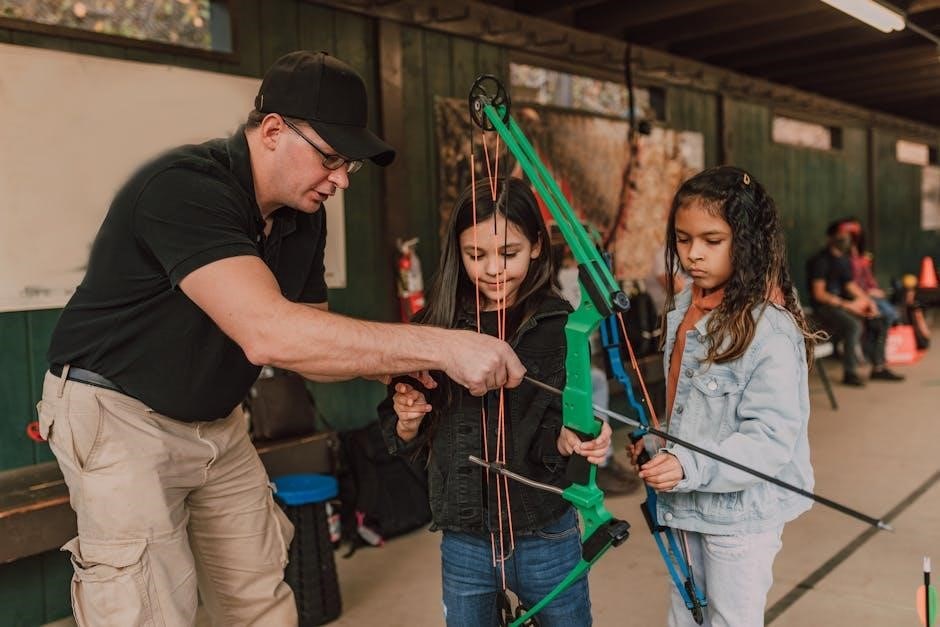
Specialized Certification Programs
Specialized certification programs, like Basic Archery Instructor (BAI) and S3DA, enhance teaching and coaching skills, catering to diverse instructor needs and advancing archery education globally.
7.1 Basic Archery Instructor (BAI) Certification
The Basic Archery Instructor (BAI) certification is designed for educators and volunteers to teach safe and effective archery lessons. Developed by NASP, it focuses on range safety, equipment handling, and instructional techniques. The program ensures instructors can deliver archery content to students, promoting a safe and engaging learning environment. This certification is essential for integrating archery into school curriculums and community programs, emphasizing safety and foundational skills for all participants.
7.2 S3DA Basic Instructor Training
S3DA Basic Instructor Training is a program designed to develop foundational archery skills and instructional techniques. It focuses on teaching participants how to safely and effectively guide archers, emphasizing proper equipment use and range safety. This training is ideal for volunteers, coaches, and educators, providing hands-on experience and practical knowledge. The curriculum covers essential archery concepts, enabling instructors to confidently lead beginner archers and create engaging, skill-building sessions.
7.3 NCCP (National Coaching Certification Program)
The National Coaching Certification Program (NCCP) is a comprehensive pathway for archery coaches, developed by the Coaching Association of Canada. It offers structured training for coaches at all levels, from introductory to advanced. The program focuses on developing coaching skills, including technique analysis, safety protocols, and ethical practices. Coaches learn to create effective training plans and communicate strategies. The NCCP is recognized nationally, ensuring consistency in coaching standards. It is ideal for both professional coaches and volunteer instructors seeking to enhance their archery teaching abilities and contribute to the sport’s growth.
7.4 Advanced Instructor/Master Coach Program
The Advanced Instructor/Master Coach Program, offered by the National Field Archery Association (NFAA), is designed for experienced archers and coaches seeking advanced training. This two-tiered program focuses on refining coaching techniques, developing high-performance strategies, and enhancing leadership skills. It emphasizes advanced archery mechanics, mental training, and competition preparation. The program is ideal for those aiming to work with elite athletes or manage large-scale archery programs, ensuring they can contribute effectively to the development of archery at higher levels.
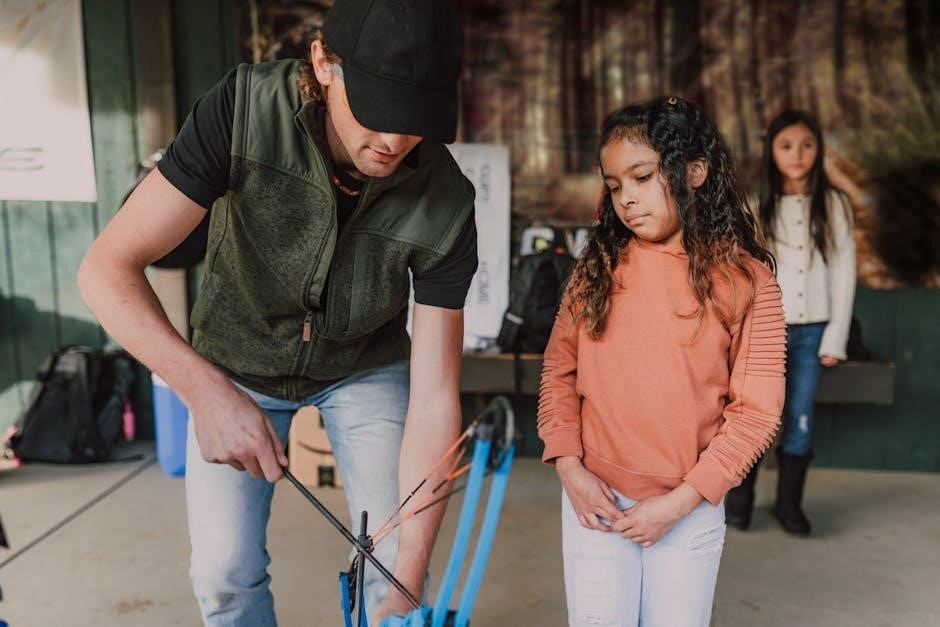
International Certification Standards
International certification standards for archery instruction ensure global consistency and quality. World Archery oversees coaching certifications, while international judges must obtain accreditation to officiate at major events, ensuring uniformity worldwide.
8.1 World Archery Coaching Certification
World Archery offers a coaching certification program designed to develop skilled instructors globally. The program includes courses for coaches at all levels, from beginner to elite, ensuring comprehensive training in archery techniques, safety, and athlete development. Certification involves both theoretical and practical assessments, with a focus on producing coaches who can effectively guide archers in various settings, from grassroots to competitive levels, while adhering to international standards and best practices in the sport.
8.2 International Judges Accreditation
International Judges Accreditation is a critical component of maintaining fairness and consistency in archery competitions worldwide. Judges must obtain current accreditation to officiate at major events, including World Championships and the Hyundai Archery World Cup. This accreditation involves rigorous training and testing, ensuring judges possess deep knowledge of archery rules, scoring systems, and safety protocols. World Archery oversees this process, providing structured educational programs to prepare judges for the demands of high-level competitions, ensuring accuracy and impartiality in their decisions.
8.3 Global Recognition of Certifications
Archery instruction certifications are widely recognized internationally, ensuring instructors can teach and coach across borders. Organizations like USA Archery and World Archery have established standards that are accepted globally, allowing certified professionals to work in various countries. This recognition enhances career opportunities and fosters collaboration in the archery community. The consistency in certification criteria ensures that instructors meet high standards, whether teaching in local clubs or international events, promoting unity and excellence in archery education worldwide.
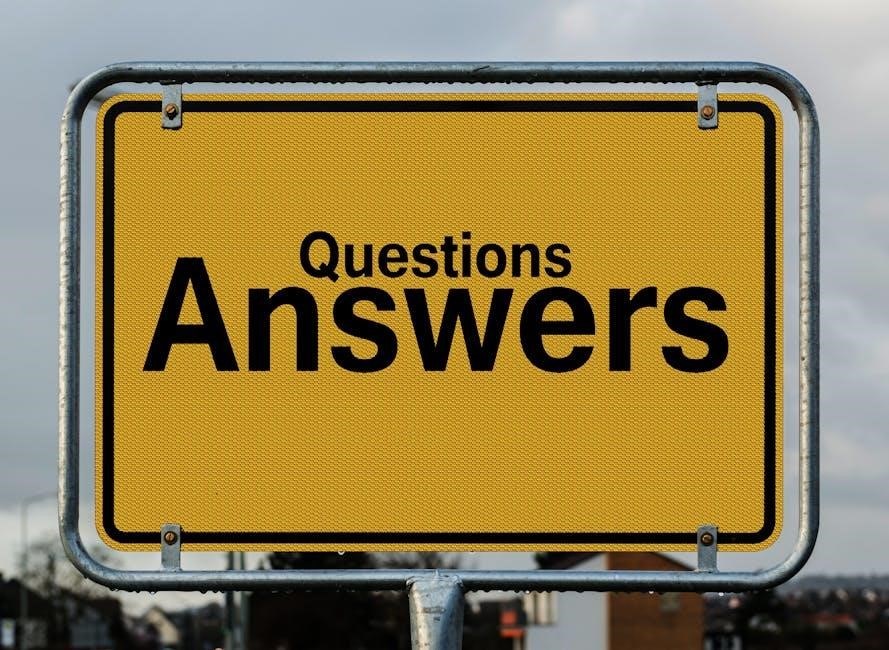
Continuing Education and Professional Development
Continuing education and professional development are crucial for archery instructors, ensuring they stay updated on trends and best practices. Workshops, clinics, and renewal programs help maintain certification and enhance skills, fostering growth and excellence in archery instruction.
9.1 Workshops and Clinics
Workshops and clinics provide archery instructors with hands-on training and updated methodologies. These events cover topics like range setup, equipment maintenance, and advanced teaching techniques. They offer practical experience, ensuring instructors stay current with industry standards and safety protocols. Clinics often feature expert coaches sharing insights on improving archer performance and addressing common challenges. Such sessions are essential for professional growth, helping instructors refine their skills and deliver high-quality training programs. Regular participation ensures continuous improvement in archery instruction and coaching excellence.
9.2 Coaching Certification Renewal
Coaching certification renewal ensures instructors stay updated with the latest techniques and safety standards. Typically required every 3 years, renewal involves continuing education through workshops or clinics. Instructors must complete specific courses or activities to maintain their credentials, ensuring they remain proficient in teaching archery safely and effectively. Renewal also reflects a commitment to professional development, keeping instructors aligned with industry advancements and best practices in archery education.
9.3 Staying Updated with Archery Trends
Staying updated with archery trends is crucial for instructors to remain effective and relevant. Workshops, online courses, and attending events provide opportunities to learn new techniques and adapt to industry advancements. Instructors can also stay informed through publications, webinars, and professional networks. Regular updates ensure they incorporate the latest teaching methods, equipment innovations, and safety protocols into their lessons, enhancing their students’ learning experiences and keeping up with evolving archery standards and technologies.
Archery instruction certification is vital for promoting safe, effective, and enjoyable archery experiences; It empowers instructors with essential skills, enhancing the sport’s growth and accessibility for all participants.
10.1 Final Thoughts on Archery Instruction Certification
Archery instruction certification is a vital investment for anyone passionate about teaching archery. It ensures instructors possess the necessary knowledge, safety protocols, and teaching techniques to guide archers effectively. By completing certification, instructors gain credibility, enhance their skills, and contribute to the sport’s growth. Certification also provides a structured approach to teaching, ensuring a safe and enjoyable experience for students. This certification is a cornerstone for developing competent archers and fostering a love for the sport at all levels.
10.2 Encouragement to Pursue Certification
Pursuing archery instruction certification is a rewarding decision that enhances your ability to teach and inspire others. It not only boosts your credibility but also equips you with essential skills to ensure safety and proper techniques. By becoming certified, you contribute to the growth of archery while gaining access to career opportunities and personal fulfillment. Embrace this journey to make a meaningful impact on the sport and its enthusiasts at every level.


